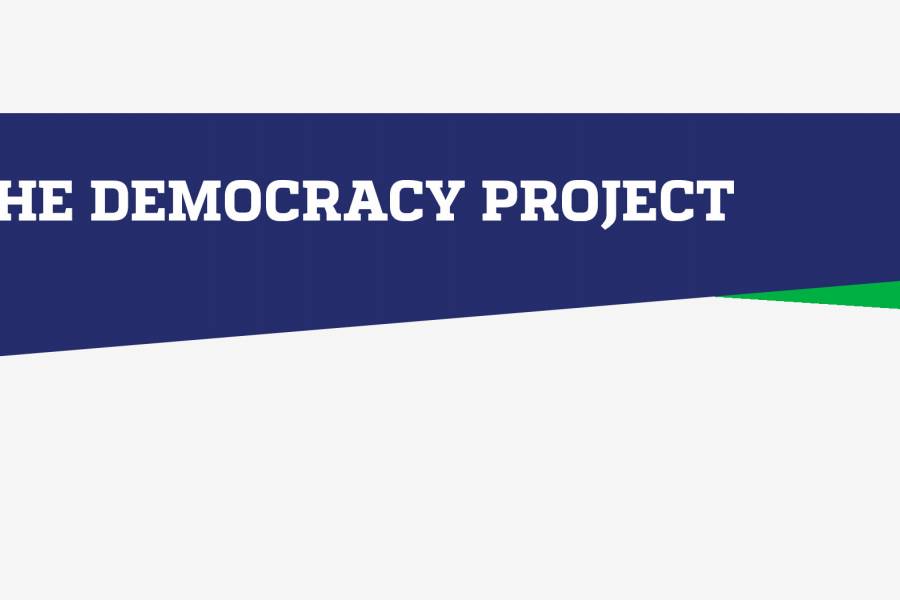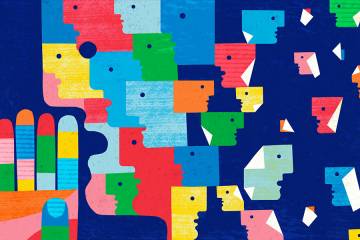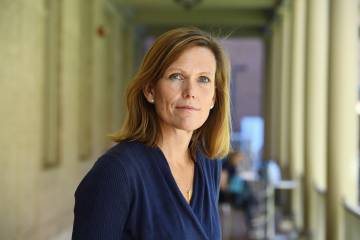
Image caption:Adam Seth Levine is the Stavros Niarchos Foundation Agora Institute associate professor of health policy and management in the Johns Hopkins Bloomberg School of Public Health. He is also the president and co-founder of research4impact, a nonprofit that fosters meaningful collaborations between researchers, practitioners, and policymakers.
Image credit: Will Kirk / Johns Hopkins University
Democratic self-governance requires that people with diverse knowledge and lived experience work together to solve problems. Yet too often this does not happen, as people are determined to remain strangers.
Distrust and hostility are two reasons why. Collaboration requires that people have civil conversations, treat others with respect, and are open to reconsidering their views after learning new information. Many Americans are not confident about others' ability to do each of these things.
For instance, consider the realm of science and politics. Rather than collaborating with researchers to respond to our thorniest challenges—such as climate change and the novel coronavirus—some political leaders and their supporters are distorting scientific claims, challenging scientific expertise, and calling into question researchers' motivations.
These examples underscore the corrosive influence of distrust and hostility on self-governance—how it leads people to remain strangers rather than figure out new ways to share ideas, learn from each other, and work together. It's not exactly the stuff of hope.
Yet my hope comes from what I see occurring outside of the major headlines. In my community and field research, I find many instances in which people who start off as strangers to one another—such as local elected officials, nonprofit directors, organizers, and researchers—are perfectly willing to work together.
I find that they are strangers not because they are hostile to one another. Instead, they are socialized strangers. They share values and concerns, yet don't currently collaborate because their normal way of doing things—the way in which they typically achieve their goals and get the job done—has not entailed these sorts of collaborations.
Yet when offered the right opportunity, many grab it. In my own work I've studied when this happens between researchers and community leaders. For instance, social scientists and community organizers working together to boost volunteerism and cultivate new civic leaders. Or family policy researchers and county legislators joining forces to design new ways to use mobile vans that improve rural families' access to services like internet and basic health screenings.
Collaborations like these are important because they directly strengthen American democracy. They cultivate people's sense of agency and collective power and improve the ability of governments to meet the needs of their people. They also provide a needed antidote to the stories of hostility that are too often media exemplars. They are a path of possibility.
The challenge is that these new collaborations often don't happen organically. My hope for American democracy rests on a mindset shift, where we go from assuming that strangers are hostile to one another, toward assuming instead that communities around the country contain many socialized strangers. The goal is to find them, acknowledge that they share values and concerns, and then offer them the opportunity to work together in ways that strengthen American democracy from the ground up.
About The Democracy Project
The future of democracy as a system of government is increasingly uncertain. With a rise of populist forces globally and many existing democracies in regression, liberty itself seems under assault. In the United States, a diminished or warped democracy could have far-reaching repercussions for voting rights, the rule of law, education, the application of science, immigration, citizenship, and long-held societal norms we take for granted.
As we near an election in which many of the defining principles of democracy seem to hang in the balance, an array of Johns Hopkins experts will share their greatest hopes, their deepest fears, and their informed insights on the state of America's democratic experiment. Read more from The Democracy Project
Posted in Voices+Opinion, Politics+Society
Tagged snf agora institute, democracy











